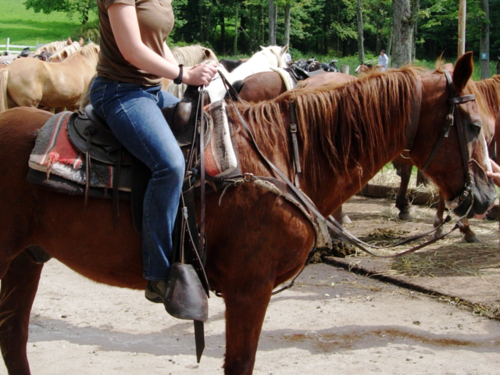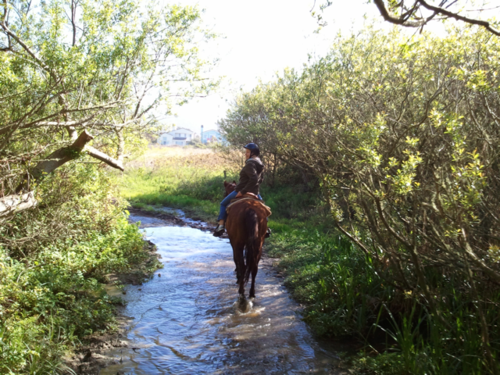Grab the Reigns! Training the Mind to Find Happiness
 Until recently, meditation was a very fuzzy concept to me. Growing up in a pretty homogenous, East coast suburb, I never knew anyone who meditated. My understanding consisted of abstract and puzzling instructions, like ‘sit, quiet your mind, and think of nothing.’ “Nothing! Why would you think of nothing?! What a waste of time,” I thought. Hence, meditation wasn’t at the top of my list of things to try.
Until recently, meditation was a very fuzzy concept to me. Growing up in a pretty homogenous, East coast suburb, I never knew anyone who meditated. My understanding consisted of abstract and puzzling instructions, like ‘sit, quiet your mind, and think of nothing.’ “Nothing! Why would you think of nothing?! What a waste of time,” I thought. Hence, meditation wasn’t at the top of my list of things to try.
But I felt a bit stuck in life. While I had many happy parts of my life, I didn’t feel a baseline of contentment. External things would unglue me more easily than I would like, and negative thoughts and emotions would too often creep into my mind. I had no idea how to feel more consistently content, but I thought there must be a way. I tried many things to find a more peaceful state - including sheer willpower, increasing positive experiences or things around me, and other self-help strategies. Some of these things provided small gains, but the results were fleeting.
After moving to California, I started to meet people who practiced meditation. Something was different about their disposition. They seemed calm at their core, and imbued with a kind of grounded optimism. Sensing that this might be what I was missing, I asked about their experiences with meditation. They described their discovery of meditation as a pivotal experience in their life. “Maybe this is not such a waste of time after all,” I thought. I find that when people describe experiences as life-altering, even if I don’t understand why, I must learn more. Similar curiosities led me to study aboard in college and volunteer in Africa. People said these experiences would change me. Maybe they even described how, but I didn’t fully understand until I went myself.
Still unsure about exactly what meditation was, I dove in. I registered for a 10-day silent meditation retreat. While this was still months away, I realized that I should start learning about what I signed myself up for. What is meditation? I asked the friend that recommended the retreat and about how to prepare. She suggested a book, Turning the Mind into an Ally, by Sakyong Mipham (2003). I didn’t get too far into the book before realizing that it was a very concrete and practical explanation of meditation. It explained that the mind was like a wild horse and you were on its back. Without awareness of this arrangement, let alone training, the wild horse/the mind would go wherever it wanted to go, and you had no choice but to come along for the ride. My mind would lead me through negative thought patterns and harmful emotions in response to relatively minor stimuli, and I was just an oblivious passenger trying to hold on.
 As the book explained it, the promise of meditation was that with consistent practice you could learn to lead the wild steed. You could form a mutual relationship with the horse, but you have to patiently come to know it, and work with it to overcome engrained patterns. Like a wild horse, my mind was responding to circumstances and experiencing thoughts and emotions based on patterns I was often unaware of. Sometimes I grasped these patterns on an intellectual level, but the understanding didn’t necessarily provide me with practical tools to recondition my responses. For example, when someone would express anger toward me, I felt scared, internalized the situation to develop negative self-concepts, or struck back defensively. But this pattern, could be just that, a pattern. I didn’t have to respond that way. I could lead my mind to different reactions. I didn’t have to just remain powerless on top of the wild horse.
As the book explained it, the promise of meditation was that with consistent practice you could learn to lead the wild steed. You could form a mutual relationship with the horse, but you have to patiently come to know it, and work with it to overcome engrained patterns. Like a wild horse, my mind was responding to circumstances and experiencing thoughts and emotions based on patterns I was often unaware of. Sometimes I grasped these patterns on an intellectual level, but the understanding didn’t necessarily provide me with practical tools to recondition my responses. For example, when someone would express anger toward me, I felt scared, internalized the situation to develop negative self-concepts, or struck back defensively. But this pattern, could be just that, a pattern. I didn’t have to respond that way. I could lead my mind to different reactions. I didn’t have to just remain powerless on top of the wild horse.
 Every other day I would add another 5 minutes to my total time. To build these skills and develop strength in leading the horse, I would have to practice regularly. Weight lifting was used as another helpful metaphor in the book; you can’t expect to walk into a gym, be able to lift the largest weight, and walk out all finished with your training. In the same way you can’t expect to meditate for a week and be able to handle your strongest emotions with peace.
Every other day I would add another 5 minutes to my total time. To build these skills and develop strength in leading the horse, I would have to practice regularly. Weight lifting was used as another helpful metaphor in the book; you can’t expect to walk into a gym, be able to lift the largest weight, and walk out all finished with your training. In the same way you can’t expect to meditate for a week and be able to handle your strongest emotions with peace.
This article is posted here with permission from the author. Joanna Holsten blogs at "Let's Live Nice,"which documents her journey towards a more critically compassionate life, exploring ideas and actions for a world with less suffering and more happiness.
SHARE YOUR REFLECTION
13 Past Reflections




On May 9, 2012 Gregor wrote:


On Feb 6, 2012 Haarka gurung wrote:
It is very good to know. I really like to do meditation.I think,it will support in many things.

On Feb 5, 2012 murray fulcher wrote:
over time i have somewhat replaced the word to describe my practice of meditation with 'mindfulness' Who is watchingthe caretaker of your thoughts? am I here in the 'now' or lost somewhere in a fantasy/daydream of the past.,or creating an anxiety/fear in a future fantasy?

On Feb 5, 2012 Manoj wrote:
Hi
You can meditate on concentrating on different sound.. simple thing , Early moring meditate between 2 A.M to 4 A.M, When the nature is cool, more cosmic energy is available abudent , sit on a comfortable space, listen to heart beat and meditate for 40 min... you can feel the cosmic energey flowing to you ....
manoj

On Feb 4, 2012 Ficus wrote:
In any given situation you can make a different choice. Your article points to the important issue of learning not to internalize upsetting experiences and then 'letting' them make you feel bad about yourself and the world. It really is not what happens to you, but how your respond to it. Thank you for this thoughtful article.

On Feb 4, 2012 Ruben Neal wrote:
Dedicate yourself to being better every single day
Focus on making a difference, because if you’re not making someonelses life better, your wasting your time

On Feb 4, 2012 christine phillips wrote:
Nice article. I meditate and train and ride horses. The analogy is perfect because you are never in control of a horse, just guiding it in partnership

On Feb 3, 2012 Knitaluthria wrote:
Thanks so much for sharing. I have been trying to get into the habit of meditation (without much success) for a while now. But I persist hoping that one day I will "get it". Your article gave me renewed motivation to keep trying.

On Feb 3, 2012 Jim Anderson wrote:
This is good stuff to be sure. Thanks so much for sharing, the daily guidance is very helpful. Makes me refocus on what is important. For those who also visit here and leave a comment, the following is a link to a book I recently finished writing and you can listen to the first chapter by visiting my blog: http://jamesanderson.author... Enjoy!
1 reply: Themagichat | Post Your Reply

On Oct 17, 2013 Bipin wrote:
Nice explanation for beginner of meditation.
Post Your Reply